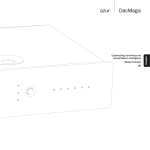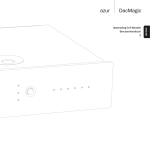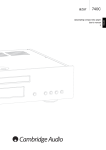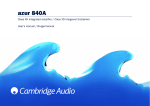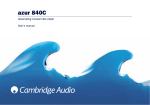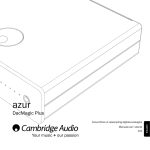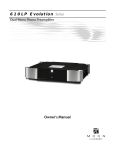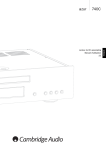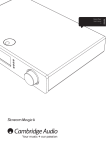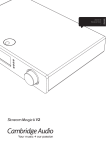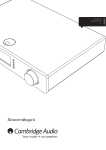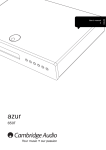Download Cambridge DacMagic
Transcript
DacMagic Upsampling digital to analog converter User’s manual 2 ENGLISH azur Contents Introduction............................................................................................................................................ 3 Important safety instructions ............................................................................................................... 4 Rear panel connections ........................................................................................................................ 8 Front panel controls .............................................................................................................................. 10 Audio output connections ..................................................................................................................... 12 Digital audio input connections............................................................................................................ 13 PC-USB connections.............................................................................................................................. 14 Digital audio output connections ......................................................................................................... 16 Operating instructions........................................................................................................................... 17 Filters...................................................................................................................................................... 18 Technical specifications........................................................................................................................ 25 Troubleshooting ..................................................................................................................................... 26 Limited warranty.................................................................................................................................... 27 This package should contain the following: 1 x Azur DacMagic (assembled), 1 x AC 12V 1.5A power adaptor, 4 x rubber feet, 1 x rubber base, 1 x USB ‘B-A’ type lead, 1 x user’s manual For further information about Cambridge Audio, our products, news, reviews and support, please visit www.cambridge-audio.com 2 azur DacMagic Thank you for purchasing this DacMagic Upsampling Digital to Analog Converter. We are confident that you will enjoy many years of listening pleasure from it. The DacMagic features ATFTM (Adaptive Time Filtering), an up-sampling process developed in conjunction with Anagram Technologies of Switzerland to intelligently interpolate incoming audio data (of between 16-24 bits, 32-96kHz) to 24bit/192kHz through the use of a 32bit Texas Instruments DSP (Digital Signal Processor). The ATF system applies sophisticated polynomial curve-fitting interpolation to create the extra data points and incorporates a time domain model which adaptively generates the new data in the temporal domain, dramatically reducing digital jitter, even that present in the input audio. As with our high-end CD players, our proprietary Dual Differential Virtual Earth Balanced filter topology is used, configured as a low-order two pole linear-phase Bessel filter to take advantage of the high sampling rate achieved. Two very high quality Wolfson WM8740 24bit DAC ICs are used in dual differential mode. Since each channel has its own DAC to process information, completely separate and symmetrical analog filter circuitry can be implemented. These allow both left- and right-channel circuitry to operate identically, ensuring the DacMagic delivers fantastic sound-staging and stereoimaging properties. Two digital inputs are fitted (both featuring S/P DIF and TOSLINK) and allow a wide range of digital sources to be connected. In addition, a USB input enables the DacMagic to be connected to a PC and act as a very high quality DAC/Soundcard, offering genuine HiFi-quality playback from your desktop, media PC, etc. A digital output is fitted which passes through the selected digital source for recording purposes (no up-sampling performed). Your DacMagic can only be as good as the system it is connected to. Please do not compromise on your amplifier, speakers or cabling. Naturally, we particularly recommend amplification from the Cambridge Audio range. Your dealer can also supply excellent quality Cambridge Audio interconnects to ensure your system realises its full potential. Thank you for taking the time to read this manual; we recommend you keep it for future reference. Matthew Bramble Cambridge Audio Technical Director and the DacMagic design team 3 ENGLISH Introduction Important safety instructions For your own safety please read the following important safety instructions carefully before attempting to connect this unit to the mains power supply. They will also enable you to get the best performance from and prolong the life of the unit: 1. Read these instructions. 2. Keep these instructions. 3. Heed all warnings. 4. Follow all instructions. 5. Do not use this apparatus near water. 6. Clean only with a dry cloth. 7. Do not block any ventilation openings. Install in accordance with the manufacturer's instructions. 8. Do not install near any heat sources such as radiators, heat registers, stoves, or other apparatus (including amplifiers) that produce heat. 9. Do not defeat the safety purpose of the polarized or grounding-type plug. A polarized plug has two blades with one wider than the other. A grounding-type plug has two blades and a third grounding prong. The wide blade or the third prong are provided for your safety. If the provided plug does not fit into your outlet, consult an electrician for replacement of the obsolete outlet. 10. Protect the power cord from being walked on or pinched, particularly at plugs, convenience receptacles and the point where they exit from the apparatus. 11. Only use attachments/accessories specified by the manufacturer. 12. Use with only the cart, stand, tripod, bracket, or table specified by the manufacturer, or sold with the apparatus. When a cart is used, use caution when moving the cart/ apparatus combination to avoid injury from tip-over. 13. Unplug this apparatus during lightning storms or when unused for long periods of time. 14. Refer all servicing to qualified service personnel. Servicing is required when the apparatus has been damaged in any way, such as the power-supply adaptor having been damaged, liquid has been spilled or objects have fallen into the apparatus, the apparatus has been exposed to rain or moisture, does not operate normally, or has been dropped. 4 azur DacMagic The unit must be installed in a manner that makes disconnection of the mains plug from the mains socket outlet (or appliance connector from the rear of the unit) possible. Where the mains plug is used as the disconnect device, the disconnect device shall remain readily operable. Only use the power supply adaptor supplied with this unit. Please ensure there is ample ventilation (at least 5cm clearance all round). This unit must not be used near water or exposed to dripping or splashing water or other liquids. No objects filled with liquid, such as vases, shall be placed on the unit. WEEE symbol The crossed-out wheeled bin is the European Union symbol for indicating separate collection for electrical and electronic equipment. This product contains electrical and electronic equipment which should be reused, recycled or recovered and should not be disposed of with unsorted regular waste. Please return the unit or contact the authorised dealer from whom you purchased this product for more information. CE mark This product complies with European Low Voltage (2006/95/EC) and Electromagnetic Compatibility (89/336/EEC) Directives when used and installed according to this instruction manual. For continued compliance only Cambridge Audio accessories should be used with this product and servicing must be referred to qualified service personnel. C-Tick mark This product meets the Australian Communications Authority’s Radio communications and EMC requirements. Ross Test Stamp This product meets Russian electronic safety approvals. 5 ENGLISH WARNING – To reduce the risk of fire or electric shock, do not expose this unit to rain or moisture. FCC regulations NOTE: THE MANUFACTURER IS NOT RESPONSIBLE FOR ANY RADIO OR TV INTERFERENCE CAUSED BY UNAUTHORIZED MODIFICATIONS TO THIS EQUIPMENT. SUCH MODIFICATIONS COULD VOID THE USER AUTHORITY TO OPERATE THE EQUIPMENT. This equipment has been tested and found to comply with the limits for a Class B digital device, pursuant to Part 15 of the FCC Rules. These limits are designed to provide reasonable protection against harmful interference in a residential installation. This equipment generates, uses and can radiate radio frequency energy and, if not installed and used in accordance with the instructions, may cause harmful interference to radio communications. However, there is no guarantee that interference will not occur in a particular installation. If this equipment does cause harmful interference to radio or television reception, which can be determined by turning the equipment off and on, the user is encouraged to try to correct the interference by one or more of the following measures – Re-orient or relocate the receiving antenna. – Increase the separation between the equipment and receiver. – Connect the equipment into an outlet on a circuit different from that to which the receiver is connected – Consult the dealer or an experienced radio/TV technician for help. Ventilation IMPORTANT – The unit will become warm when in use. Do not stack multiple units on top of each other. Do not place in an enclosed area such as a bookcase or in a cabinet without sufficient ventilation. Positioning Choose the installation location carefully. Avoid placing it in direct sunlight or close to a source of heat. No naked flame sources, such as lighted candles, should be placed on the unit. Also avoid locations subject to vibration and excessive dust, cold or moisture. The unit can be used in a moderate climate. 6 DacMagic This unit must be installed on a sturdy, level surface. Do not place in a sealed area such as a bookcase or in a cabinet. Any space open at the back (such as a dedicated equipment rack) is fine, however. Do not place the unit on an unstable surface or shelf. The unit may fall, causing serious injury to a child or adult as well as serious damage to the product. Do not place other equipment on top of the unit. Due to stray magnetic fields, turntables or CRT TVs should not be located nearby due to possible interference. Electronic audio components have a running in period of around a week (if used several hours per day). This will allow the new components to settle down and the sonic properties will improve over this time. Power sources The unit should be operated only from the type of power source indicated on the marking label. If you are not sure of the type of power-supply to your home, consult your product dealer or local power company. Overloading Do not overload wall outlets or extension cords as this can result in a risk of fire or electric shock. Overloaded AC outlets, extension cords, frayed power cords, damaged or cracked wire insulation and broken plugs are dangerous. They may result in a shock or fire hazard. Be sure to insert each power cord securely. To prevent hum and noise, do not bundle the interconnect leads with the power cord or speaker leads. Cleaning To clean the unit, wipe its case with a dry, lint-free cloth. Do not use any cleaning fluids containing alcohol, ammonia or abrasives. Do not spray an aerosol at or near the unit. Servicing These units are not user serviceable. Never attempt to repair, disassemble or reconstruct the unit if there seems to be a problem. A serious electric shock could result if this precautionary measure is ignored. In the event of a problem or failure, please contact your dealer. 7 ENGLISH azur Rear panel connections DacMagic Upsampling DAC Designed in the UK, Made in China Caution www.cambridge-audio.com 3 Serial Number Label Removed 4 5 Digital Outputs Digital Input 1 Digital Input 2 USB In 1 ANAGRAM TECHNOLOGIES 12V 1500mA R Right Incorporating Q5™ from: 6 L Left Unbalanced Output 7 Right — Balanced Output — Left 2 S/P DIF Co-axial Manufactured in an ISO9001 approved facility Toslink Optical S/P DIF Co-axial Toslink Optical S/P DIF Co-axial Toslink Optical Use supplied PSU only! This device complies with part 15 of the FCC Rules. Operation is subject to the following two conditions: 1) This device may not cause harmful interference; 2) This device must accept any interference, including interference that may cause undesired operation. 1 Unbalanced Audio Outputs Single-ended conventional stereo outputs for connection to the line-level phono/RCA inputs of an amplifier. 2 Balanced Audio Outputs The DacMagic also features true balanced (XLR) outputs. This is a higher quality output that can reject noise and interference with equipment with balanced inputs. These balanced outputs are ideally suited for connection to the Cambridge Audio 840A or 840E amplifiers. XLR connectors should be wired as follows: Pin 1 – Ground; Pin 2 – Hot (in-phase); Pin 3 – Cold (phase-inverted). 3 Digital Outputs The digital outputs allow a digital recording device to be connected. These outputs loop or passthrough unprocessed digital audio from the selected digital input. Two types are available (both the co-axial and the optical are active concurrently and can be used to connect and run equipment at the same time): S/P DIF co-axial – to obtain best results, use a high quality 75 ohm digital RCA interconnect cable (not one designed for normal audio use). 8 DacMagic TOSLINK optical – use a high quality TOSLINK fibre-optic interconnect cable designed specifically for audio use. To achieve the best results we always recommend using high quality Cambridge Audio leads, which are guaranteed for life. Note: These outputs are pass-through only; there is no upsampling or any other modification done to the LPCM input signal. 4 5 Digital Inputs 1 and 2 The DacMagic is fitted with two sets of digital inputs which enable the connection of source components. Each input has both S/P DIF and TOSLINK types fitted. Only one of the two types for each input should be connected at any one time. If both the optical and co-axial outputs have connections made to them (even if only one is attempting to function), neither will work. S/P DIF co-axial – to obtain best results, use a high quality 75 ohm digital RCA interconnect cable (not one designed for normal audio use). TOSLINK optical – use a high quality TOSLINK fibre-optic interconnect cable designed specifically for audio use. Note: This unit only accepts two-channel LPCM digital audio (e.g. Dolby Digital 2.0). You cannot connect a Dolby Digital 5.1 or a DTS signal as they will not be recognised. If you wish to connect a DVD or similar device, please ensure that the sound output of your player is set to two-channel PCM. 6 USB In USB ‘Type B’ input allowing direct connection to a PC via a Type B to Type A USB lead. The DacMagic’s operation is independent of your PC soundcard – it will operate whether your PC has a soundcard or not. 7 AC 12V 1.5A Power Adaptor Socket Once you have completed all connections, plug the supplied power adaptor into the DacMagic. Important Note: Use the supplied power supply unit ONLY. 9 ENGLISH azur Front panel controls On / Off Source Lin Filter / Phase Phase Incoming Sample Rate 32 1 Digital 1 Digital 2 DacMagic 44.1 48 88.2 96 Min 4 Steep 2 5 3 Upsampling DAC 1 Power On/Off Switches the unit between On and Off. 2 Source Press to select between USB playback or Digital Inputs 1 and 2. The corresponding LED will light up to show which source has been selected. 3 Filter/Phase Select Momentarily press to select between three different filter modes: linear phase, minimum phase or steep (see page 18 for details). The corresponding LED will light up to show which filter has been selected. 10 DacMagic 4 Phase Indicates the output phase selected. Press and hold the Filter/Phase select button for approximately two seconds to select normal or inverted phase output. When the LED lights up, the phase is inverted by the DacMagic. If you suspect that your source material or amplifier, etc., is inverting the phase of the musical signal, you can use this function to re-invert the audio and regain absolute positive phase. 5 Incoming Sample Rate In the presence of an incoming digital stream, the relevant LED will light up to indicate the incoming digital sampling frequency (between 32kHz and 96kHz LPCM). 11 ENGLISH azur Audio output connections Note: Do not turn on the unit until all connections have been made. DacMagic Balanced Output R L L Digital Outputs Digital Inputs Digital Inputs R Unbalanced Output USB In AC adaptor OR Amplifier Unbalanced Input L L R R Balanced Input Use either the unbalanced (RCA/Phono) or balanced (XLR) outputs of the DacMagic. The XLR output is slightly better in quality as it can reject interference and noise in the cable connection and is the preferred option if your amplifier features balanced XLR inputs. It is possible to use the RCA phono connections and the XLR balanced connections at the same time, e.g. for connecting to different amplifiers or multi-room operations. 12 azur DacMagic Digital audio input connections ENGLISH Note: Do not turn on the unit until all connections have been made. DacMagic Balanced Output R L L Digital Outputs Digital Inputs Digital Inputs R Unbalanced Output USB In AC adaptor OR CD/DVD player Digital Outputs Connect your digital source to Digital Input 1. Either S/P DIF co-axial or TOSLINK optical types can be used, each being of equal quality. Important Note: Only connect one co-axial OR optical cable to each digital input. The unit will not operate if both connections are made (even if only one is active). 13 PC-USB connections Note: Do not turn on the unit until all connections have been made. PC DacMagic Balanced Output R L L Digital Outputs Digital Inputs Digital Inputs R Unbalanced Output USB In AC adaptor USB ‘B–A’ type lead 14 DacMagic Connect a USB ‘B–A’ type lead (as illustrated at left) from the DacMagic’s USB input to one of the USB ports on the PC. This is the normal type of USB lead with an oblong plug at one end and a square plug at the other. Switch on the DacMagic using the front panel On/Off switch and make sure that the USB input is selected (USB LED lit). The Windows “Found New Hardware” dialogue bubble should now appear at the bottom right-hand side of the Windows desktop. The description of the DacMagic will be displayed as “USB audio device”. Installation should be automatic and no driver disc is required. After a few seconds the message “Your new hardware is installed and ready to use” should appear to confirm that installation has been successful. Important Note: The PC’s previous audio output device should now be temporarily disabled and the DacMagic becomes the default audio playback device for the PC. This can be confirmed in the Control Panel’s Sounds, Speech and Audio Devices properties window under the Volume tab. The DacMagic is described as a “C-Media USB Headphone Set” as we use a C-Media USB interface IC running a headphone (i.e. two-channel) profile. If you wish to disconnect your DacMagic and return to using your previous soundcard, etc., simply disconnect it or switch off the power on the front panel. If the PC fails to disable the DacMagic and automatically re-enable your default soundcard, you can manually disable the DacMagic in the hardware device manager. To do this, navigate to the Device Manager (click Start — Control Panel — (Vista: Performance and Maintenance —) System — Hardware — Device Manager in Windows XP). Scroll down the device manager window and expand the heading Sound, Video and Game Controllers to display a list of the connected devices. The DacMagic will be listed as “USB Audio Device”. Click on this description to highlight in blue and then click on the Disable icon ( ) at the top of the window. A warning message will appear: “Disabling this device will cause it to stop functioning. Do you really want to disable it?” Click Yes to disable the DacMagic. The previous audio playback device will now be re-instated by Windows. Note: As Windows operating systems evolve, the path sequence to the device manager may change. However, the DacMagic will always appear as a “USB Audio Device” in the Sound, Video and Game Controllers window. Note: It is also possible to disable the DacMagic in the device manager by right-clicking on the highlighted “USB Audio device” and then clicking Disable from the sub-menu window. 15 ENGLISH azur Digital audio output connections Note: Do not turn on the unit until all connections have been made. DacMagic Balanced Output R L L Digital Outputs Digital Inputs Digital Inputs R Unbalanced Output USB In AC adaptor OR Digital recorder Digital Inputs If it is desired to loop out the currently selected digital audio for recording on a suitable device (MD, CD-R, etc.), you can connect either an S/P DIF co-axial or TOSLINK optical cable to the digital outputs as shown, each type being of equal quality. Both output types are active concurrently and both can be used simultaneously to run equipment. Note: There is no upsampling performed on the digital output pass-through. 16 azur DacMagic The DacMagic can be sited in two different positions, as shown in the accompanying diagram. It can be placed horizontally by fitting the four small individual feet, or vertically by using the large rubber ‘foot’. Power on the DacMagic using the On/Off button on the front panel. After 4-5 seconds, the unit will unmute and the current Source and Filter type will be shown by the front panel LEDs. Using the Source button on the front panel, select the appropriate digital input, i.e. USB , Digital 1 or Digital 2, that you wish to listen to. Switch on the external source input, e.g. CD player, DVD player, etc. The sampling frequency of the Digital Input will be displayed on the front panel (e.g. for a CD player – 44.1kHz). Momentarily press the Filter/Phase selector button to cycle between three different filter modes. Start playback of the source equipment. The DacMagic will output analogue audio from the Unbalanced/Balanced outputs upsampled to 192kHz 24bit. A ‘raw’ S/P DIF co-axial and TOSLINK optical digital output is also provided. These outputs can be used to connect a compatible digital recorder, e.g. CD-R/MD, etc. The DacMagic is compatible with Digital Stereo LPCM of a sampling frequency between 32-96kHz. Note: Being a stereo device, this unit does not decode 5.1 Dolby Digital or DTS Bitstreams from a DVD player, etc. When receiving a multi-channel digital input, the analogue audio outputs are muted. However, a 5.1 DD or DTS Bitstream will pass-through to the digital outputs. Horizontal placement Vertical placement 17 ENGLISH Operating instructions Filters The DacMagic DSP has three different Filter functions: Linear Phase, Minimum Phase and Steep. All three filters are highly sophisticated audiophile topologies, optimised specifically for audio playback. In our opinion, these filters offer excellent sound quality but differ subtly in optimisation, hence we’ve made all three available to you. Note: For clarity, all diagrams show the theoretical response of the DSP itself, excluding any analog filtering at the DAC output or the anti-aliasing filter applied during recording and/or mastering of the digital source. Linear Phase Filter Frequency response 20 0 -20 Magnitude (dB) -40 -60 -80 -100 -120 -140 -160 -180 -200 0 0.1 0.2 0.3 0.4 0.5 0.6 0.7 frequency/FS (input sampling rate) 18 0.8 0.9 1 DacMagic The Linear Phase filter is a highly regarded audio filter offering low ripple in both the pass and stop bands, and what is known as constant group delay. Constant group delay means that audio signals of all frequencies are always delayed by the same amount when passing through the filter. All audio is therefore fully time-coherent at the output. The trade-off with this type of filter is that due to internal feed-forward in the DSP, its impulse response will exhibit some pre-ringing. In other words, when excited with a theoretical impulse, the output has both a small amount of pre- and post-spike amplitude ringing (albeit well damped). Amplitude Impulse response 0 0 20 40 60 80 100 120 140 160 180 Time (samples) 19 ENGLISH azur Minimum Phase Filter Frequency response 20 0 -20 Magnitude (dB) -40 -60 -80 -100 -120 -140 -160 -180 -200 0 0.1 0.2 0.3 0.4 0.5 0.6 0.7 frequency/FS (input sampling rate) 20 0.8 0.9 1 DacMagic The Minimum Phase filter is another highly regarded audio filter that offers even lower ripple in the pass and stop bands. Unlike the Linear Phase filter, group delay is not constant so some timecoherence is lost; however, phase shift is low and the particular benefit with this filter is that the impulse response exhibits no pre-ringing. Amplitude Impulse response 0 0 20 40 60 80 100 120 140 160 180 Time (samples) 21 ENGLISH azur Steep Filter Frequency response 20 0 -20 Steep filter Magnitude (dB) -40 -60 Linear phase filter -80 -100 -120 -140 -160 -180 -200 0 0.1 0.2 0.3 0.4 0.5 0.6 0.7 frequency/FS (input sampling rate) 22 0.8 0.9 1 DacMagic Our Steep filter is a linear phase filter that has been optimised for stop band attenuation of close-in aliasing images. Here we have traded a little attenuation of the very highest frequency response (-2dB at 20kHz) and a little more pre- and post-ringing for a very steep attenuation just outside the pass band. The Steep filter is able to attenuate aliasing at 22kHz by some 80dB. Amplitude Impulse response 0 0 20 40 60 80 100 120 140 160 180 Time (samples) Note: All filters exhibit the same ultimate roll-off of approximately 140dB. 23 ENGLISH azur The following table shows the filter stop band attenuation: Roll-off at 20kHz Linear Phase Minimum Phase -0.1dB -0.1dB Steep -2dB Roll-off at 22kHz -10dB -10dB -82dB Ultimate roll-off 140dB 140dB 140dB We encourage you to experiment with the filters to determine which sound best to your ears and using your source equipment/programme material. The DacMagic remembers and recalls the selected filter type for each input individually, making it possible, for example, to select Steep for the USB input and Linear Phase for Digital Input 1, and so on. 24 azur DacMagic Technical specifications Dual Wolfson WM8740 24bit DACs Digital filter Texas Instruments TMS 320VC5501 DSP upsampling to 24bit 192kHz Analogue filter 2-Pole Dual Differential Bessel Double Virtual Earth Balanced Frequency response 20Hz to 20kHz (±0.1dB)* THD @ 1kHz 0dBFs <0.001% 24bit THD @ 1kHz -10dBFs <0.001% THD @ 20kHz 0dBFs <0.002% S/N ratio -112dBr Total correlated jitter <130pS Crosstalk @ 1kHz < -100dB Crosstalk @ 20kHz < -90dB Output impedance <50ohms Output level (unbalanced) 2.1V rms Output level (balanced) 4.2V rms (2.1V per phase) Digital input word widths supported 16-24bit** Digital input sampling frequencies supported 32kHz, 44.1kHz, 48kHz, 88.2kHz, 96kHz Audio output upsampling Fixed 24bit 192kHz Dimensions (H x W x D) 52 x 215 x 191mm (2.0 x 8.6 x 7.6”) Weight 1.2kg/2.6lbs ENGLISH D/A converters * Steep filter disabled ** 16bit for USB 25 Troubleshooting There is no power Ensure the supplied AC adaptor is connected securely to the PSU socket on the rear panel. Ensure that the correct mains transformer is being used and that it complies with the local electrical supply. Ensure the mains plug is fully inserted into the wall socket and is switched on. There is no sound Ensure that the amplifier is set correctly. Check that the interconnects are inserted correctly. Check that the correct digital input is selected (Incoming Sample Rate LED should be on). A low hum or buzzing sound can be heard Power cords or lighting placed near this product. Analogue inputs are not securely connected. Visit www.cambridge-audio.com and register to receive notification of future hardware and software releases. This guide is designed to make installing and using this product as easy as possible. Information in this document has been carefully checked for accuracy at the time of printing; however, Cambridge Audio's policy is one of continuous improvement, therefore design and specifications are subject to change without prior notice. If you notice any errors please feel free to email us at: [email protected] This document contains proprietary information protected by copyright. All rights are reserved. No part of this manual may be reproduced by any mechanical, electronic or other means, in any form, without prior written permission of the manufacturer. All trademarks and registered trademarks are the property of their respective owners. © Copyright Cambridge Audio Ltd 2008 26 azur DacMagic Cambridge Audio warrants this product to be free from defects in materials and workmanship (subject to the terms set forth below). Cambridge Audio will repair or replace (at Cambridge Audio's option) this product or any defective parts in this product. Warranty periods may vary from country to country. If in doubt consult your dealer and ensure that you retain proof of purchase. To obtain warranty service, please contact the Cambridge Audio authorised dealer from which you purchased this product. If your dealer is not equipped to perform the repair of your Cambridge Audio product, it can be returned by your dealer to Cambridge Audio or an authorised Cambridge Audio service agent. You will need to ship this product in either its original packaging or packaging affording an equal degree of protection. Proof of purchase in the form of a bill of sale or receipted invoice, which is evidence that this product is within the warranty period, must be presented to obtain warranty service. This Warranty is invalid if (a) the factory-applied serial number has been altered or removed from this product or (b) this product was not purchased from a Cambridge Audio authorised dealer. You may call Cambridge Audio or your local country Cambridge Audio distributor to confirm that you have an unaltered serial number and/or you made a purchase from a Cambridge Audio authorised dealer. This Warranty does not cover cosmetic damage or damage due to acts of God, accident, misuse, abuse, negligence, commercial use, or modification of, or to any part of, the product. This Warranty does not cover damage due to improper operation, maintenance or installation, or attempted repair by anyone other than Cambridge Audio or a Cambridge Audio dealer, or authorised service agent which is authorised to do Cambridge Audio warranty work. Any unauthorised repairs will void this Warranty. This Warranty does not cover products sold AS IS or WITH ALL FAULTS. REPAIRS OR REPLACEMENTS AS PROVIDED UNDER THIS WARRANTY ARE THE EXCLUSIVE REMEDY OF THE CONSUMER. CAMBRIDGE AUDIO SHALL NOT BE LIABLE FOR ANY INCIDENTAL OR CONSEQUENTIAL DAMAGES FOR BREACH OF ANY EXPRESS OR IMPLIED WARRANTY IN THIS PRODUCT. EXCEPT TO THE EXTENT PROHIBITED BY LAW, THIS WARRANTY IS EXCLUSIVE AND IN LIEU OF ALL OTHER EXPRESS AND IMPLIED WARRANTIES WHATSOEVER INCLUDING, BUT NOT LIMITED TO, THE WARRANTY OF MERCHANTABILITY AND FITNESS FOR A PRACTICAL PURPOSE. Some countries and US states do not allow the exclusion or limitation of incidental or consequential damages or implied warranties so the above exclusions may not apply to you. This Warranty gives you specific legal rights, and you may have other statutory rights, which vary from state to state or country to country. For any service, in or out of warranty, please contact your dealer. 27 ENGLISH Limited warranty Cambridge Audio is a brand of Audio Partnership Plc Registered Office: Gallery Court, Hankey Place London SE1 4BB, United Kingdom Registered in England No. 2953313 © 2008 Cambridge Audio Ltd AP23905/1-A www.cambridge-audio.com




























